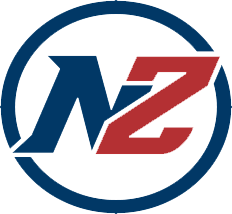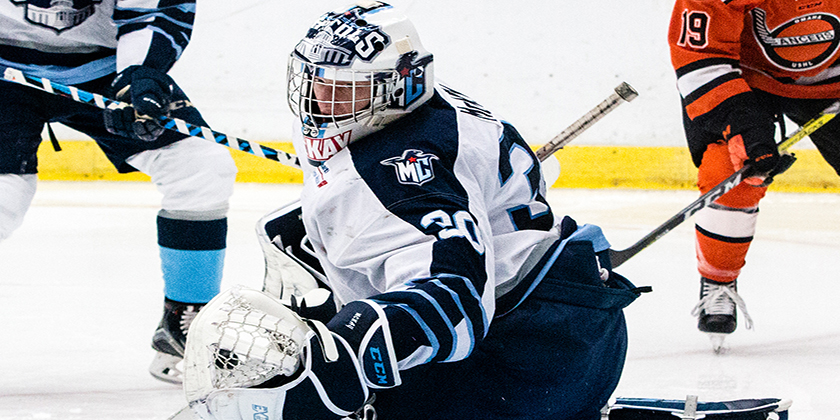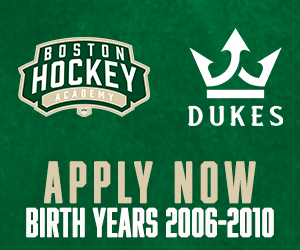This past week one of the countries top goalie prospects in the 1997 age group, Dryden McKay, committed to Minnesota State after a highly successful season with Madison Capitols in the USHL. The 3.75 star prospect sat down with Neutral Zone to tell his unique hockey story; the story of a 16-year-old heading off to the wild world of junior hockey and his trials and tribulations from being traded, to being cut, to climbing the charts to one of the premier goalies in the USHL.
Tell us about your youth hockey experience. Did you know you wanted to be a goalie right away or did that happen down the road?
I was on skates as young as two years old. At four, I began learn to skate programs and after that I moved to mite hockey splitting time between goalie and skater. My dad always wanted to make sure I was a strong skater before I made the full time jump to goalie. I’ve wanted to be a goalie as far back as I can remember because my dad was a goalie himself and was a goalie coach at the junior level when I was young. He even named me after his favorite goalie, Ken Dryden, so it was destiny for me to find my way to the net. I made the full time jump to goalie my first year at the squirt level.
You played your Bantam and U16 hockey with Chicago Young Americans. How did that help develop your game for junior hockey.
The CYA years were very important to my development because I got the opportunity to play a lot and see a lot of shots. My coach in midgets (Gregg Naumenko) was vital to my game because he was a goalie himself and taught me a lot. He gave me an opportunity and showed confidence in me at a time when many junior scouts were looking for players to draft and play for them in the near future. Getting to play against high level teams in pressure situations was also key for my preparation for junior hockey.
You played 37 games in the NAHL as a 16-17-year-old for Springfield Jr. Blues who had drafted you in the 2014 NAHL Draft. Tell us about that experience of playing in the NAHL as a 16-year-old and moving away from home for the first time.
Moving away at 16 was hard but I knew if I wanted to play college hockey that it was a necessary step. Being a junior in high school and playing junior hockey was a lot to handle at times but I learned how to adapt to that lifestyle. Springfield was only two and a half hours from home so that definitely made things easier because my parents were able to come see me often. Again, I had a coach that was a former goalie (Tony Zasowski) and he gave me the opportunity to play and challenge myself against players as much as 4 years older than me. I learned a lot that year, both on and off the ice, and matured as a person. I had fun, but also dealt with the ups and downs of junior hockey.
You have been drafted by two different teams in the USHL, traded and played on two different teams in the NAHL. Tell us about your junior hockey experience overall and how that has prepared you for college hockey.
I learned fast that junior hockey is a business based on winning. Teams and coaches will do what they feel is best to have a chance to win. I learned how crucial it is to be at your best every day. I also learned a lot of it is out of my control. Things happen and it’s all about how you react. Getting traded was unexpected and tough but I loved my time in Corpus and my year living in Texas. Getting cut by Green Bay last year was a tough pill to swallow but I was given an opportunity in Madison and I ran with it. I have learned that when one door closes another opens and it’s all about making sure you have good impressions in the hockey community. I have faced a lot of different situations and seen a lot of places in junior hockey and I think that will only benefit me in college.
You had a great season last year as the starter for Madison. Tell us about your first full season in the USHL and what your thoughts are on the upcoming season.
I feel my two years in the NAHL and my off-season training last summer really made a difference for me last year. The USHL is the top league for a reason and there are many elite players. For myself it was all about finding ways to separate myself from the pack. Whether it was vision training or staying out after practice, I always made sure I was doing the most I could to set myself up for success. I had to earn the starts I got and that only benefited me. We had a tough year as a team but I felt like I belonged at that level and proved it. This year we will have a better and more experienced team and I think we have the potential to make a run. I will be in more of a leadership role this year so I have to continue to give my team a chance to win every night.
When did the college hockey recruiting start for you. What made you chose Holy Cross initially?
The first and only college that expressed interest was Holy Cross at the end of my year in Corpus. They were the only school that kept in touch throughout that summer and I eventually went on a visit at the end of October last year. I accepted the offer there because I wasn’t sure another Division 1 offer would present itself. By December, I started to realize that I made a rushed decision without making sure it was a good fit for me academically and athletically.
You recently committed to Minnesota State. Tell us about that decision and why you chose that particular program.
I chose Minnesota State because it was a perfect fit for me. They have a great business program, beautiful campus, brand new hockey facilities, and an unbelievable coaching staff. It is also relatively close to home. I was in touch with about 5 other schools after my decommitment to Holy Cross and went on one other visit, but after seeing everything Minnesota State had to offer I was convinced it was the place for me.
Our analytics team showed that most NCAA D1 committed goaltenders are over 6’2”. How have you been able to do what you have in junior hockey at your size. Have you been overlooked by teams in the past because of your size?
In today’s game it is no secret that everyone wants a tall goalie. They also want goalies that stop the puck. Every year I’ve had to prove that despite being “undersized” I can stop the puck just as well as a goalie that is 6’2″. As a smaller goalie my positioning and skating movements are very important. As long as I am in the right spot, I give myself the best chance to stop the puck. While the taller goalies are sometimes given opportunities, I feel I have had to earn everything I have gotten. I’m sure I have been overlooked due to my size, but that is out of my control and something I try not to think about.
You will enroll at Minnesota next fall. What you are going to be working on this season to prepare for college hockey and what you’d like to accomplish in your last year of junior hockey?
This year I have to make sure I continue to take steps to improve my game. Any player can always get faster, stronger, more powerful, etc. I need to improve my rebound control and make sure I stay consistent. The college game will be a step up in every aspect so I need to make sure I am prepared. I have yet to make the playoffs in my junior career so it is definitely a goal of mine to go as far as we can this year.
You are heading into your fourth season of junior hockey. Taking a step back, share with us what you have learned from your experiences in junior hockey. What advice would you give someone who is entering the junior hockey world and trying to get an NCAA or CHL deal.
Junior hockey has given me valuable life lessons and provided lifelong friends and memories. There is no doubt it is a grind at times but if you love hockey and enjoy what you are doing you will have a positive experience. I would tell people to not get caught up in the outside noise and distractions. I made the mistake of worrying about what opportunities other players were getting instead of focusing on what I needed to do. As long as you handle your game and focus on being a good teammate and the best player you can be, NCAA and CHL teams will find you.
Photo Credit: USHL





